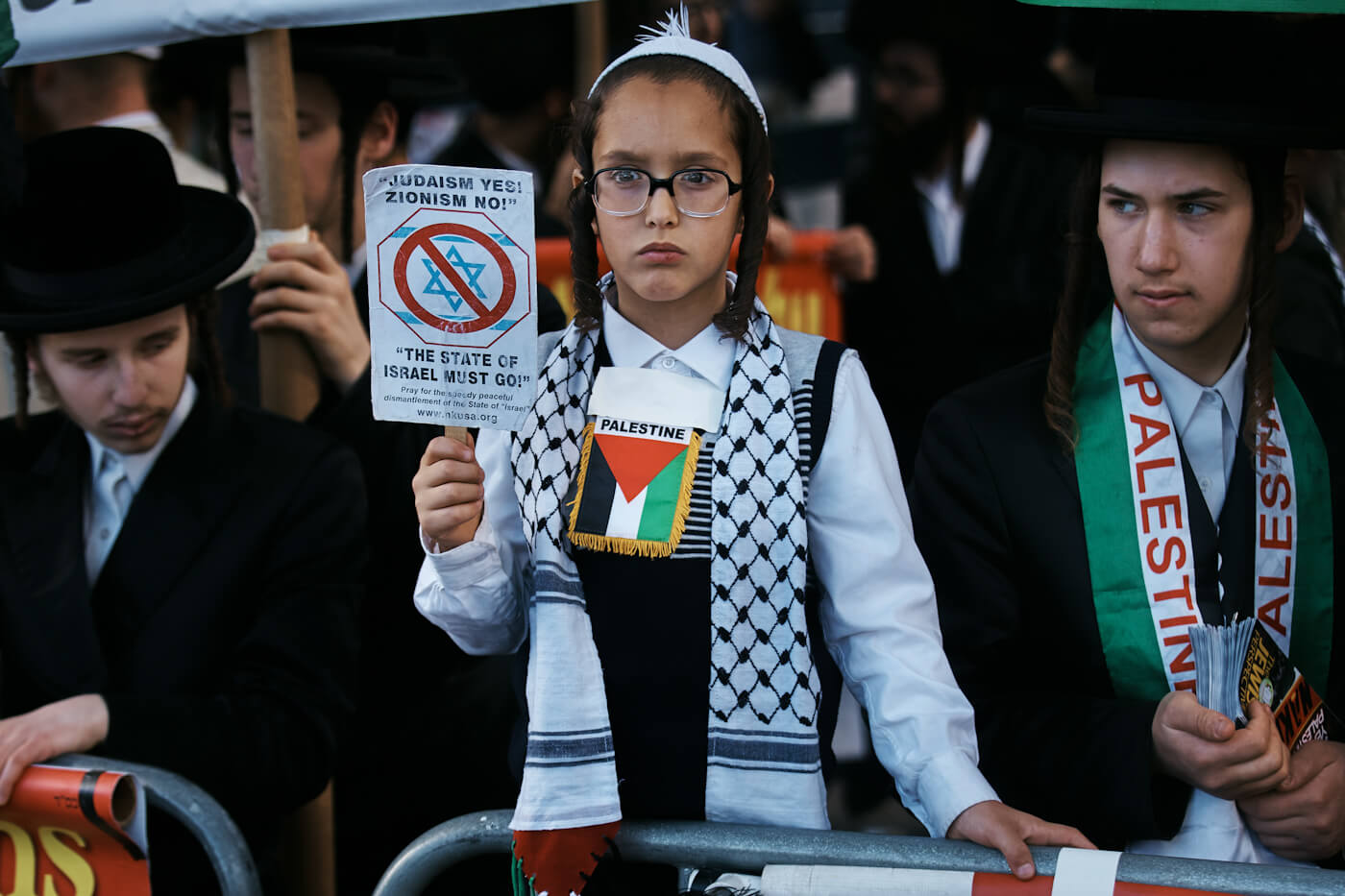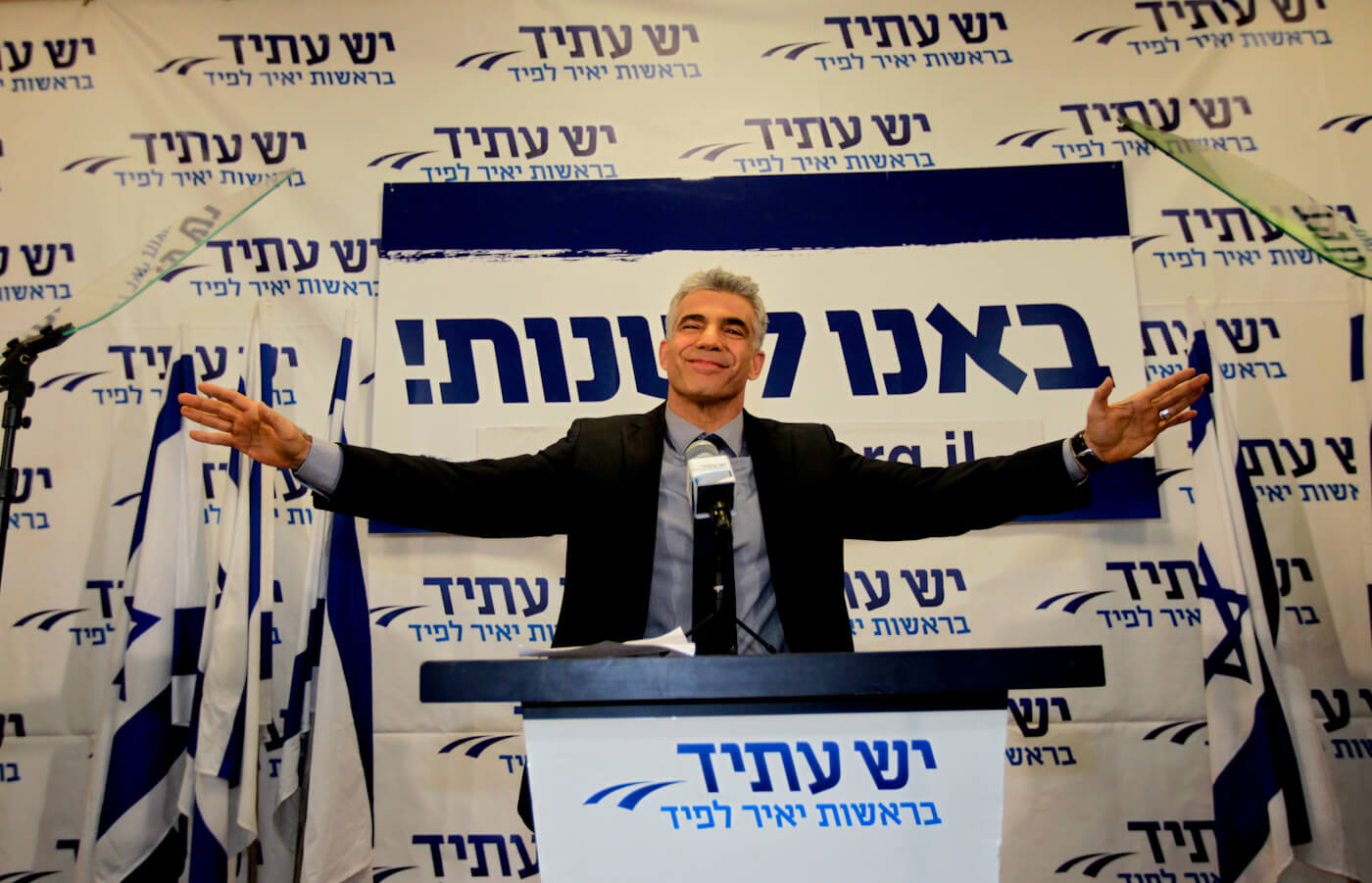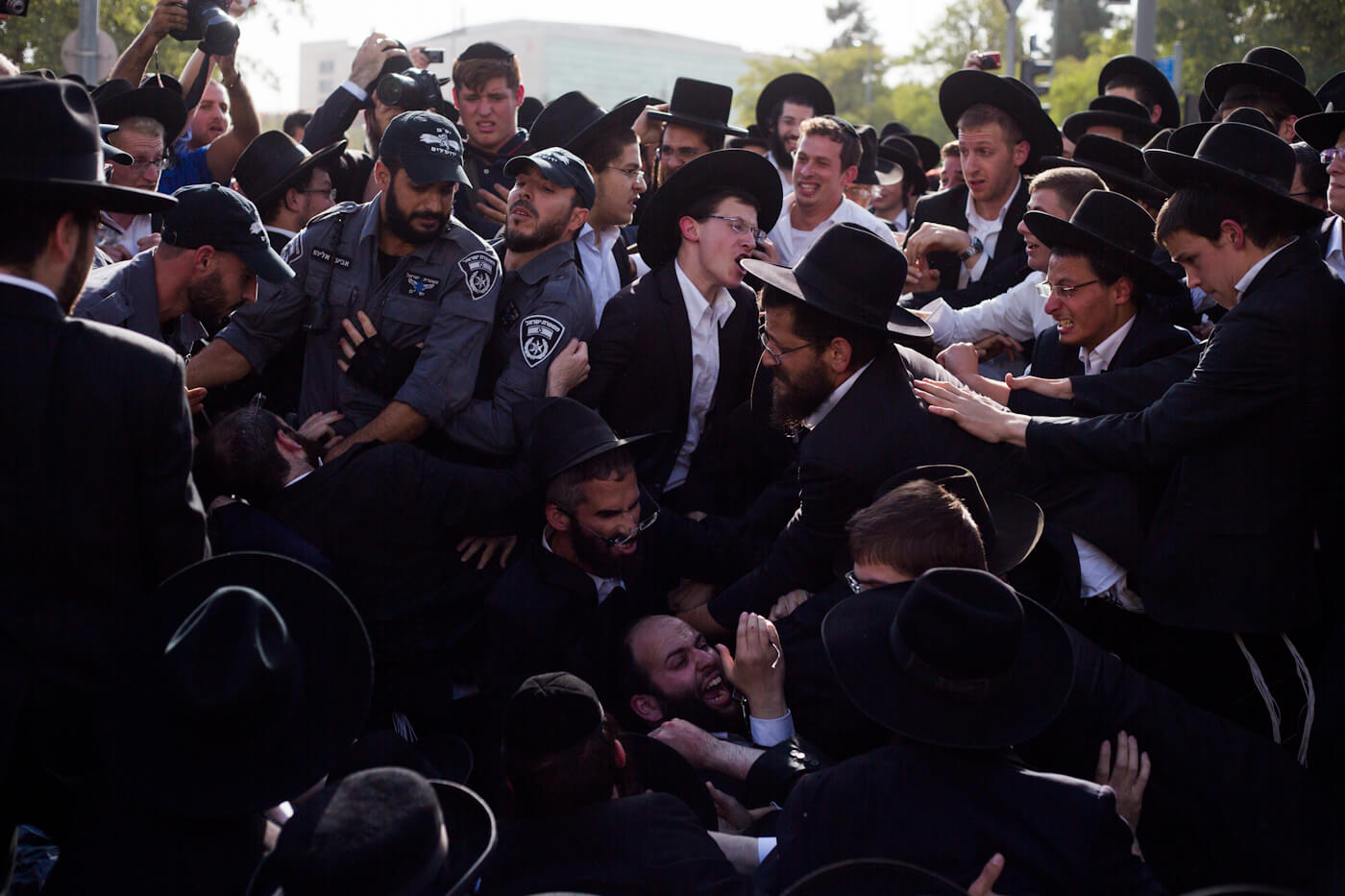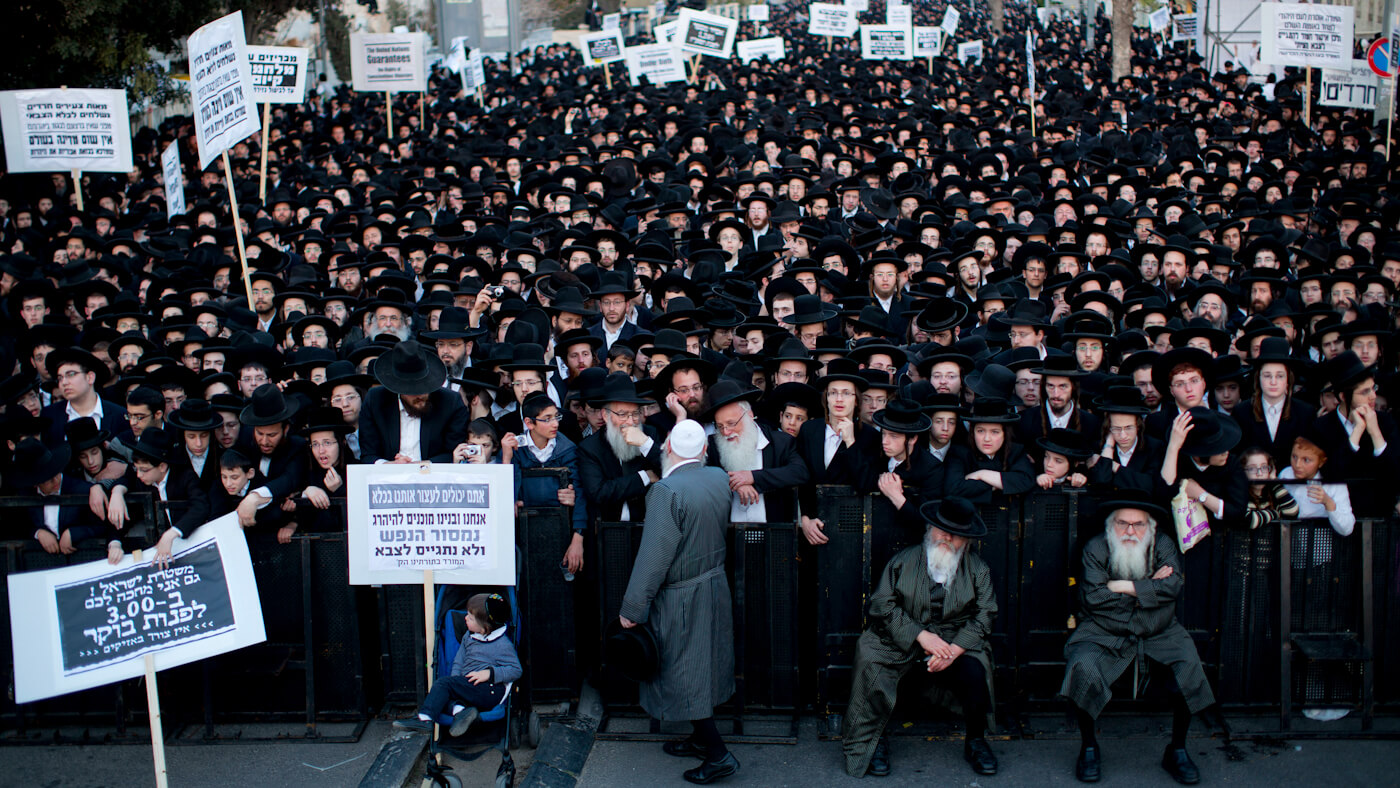Mea Sha’arim, Jerusalem – “Nazis, Nazis,” that’s what I thought I heard. I was driving down the main road near Jerusalem’s Ultra-orthodox Me’a Sha’arim neighborhood where hundreds of young Haredi Jews were blocking the road. Dumpsters were burning and the traffic came to a halt. I jumped out of the car and ran to see what was happening. I asked a young Yeshiva student what was going on and if they were really shouting “Nazis.” He confirmed to me that they were calling the Israeli riot police Nazis and that this protest was because the police had just arrested several Haredi girls for refusal to serve in the Israeli army.
Nazis? I asked him, really? He then went on to describe the abuse and violence with which the police treat the young men and women in this community, particularly since Israel’s draft law had changed, making them all potential deserters.
It may be impossible to imagine a deeper divide than the one separating the two sides of this issue. Like a tiger that was allowed to remain in quiet slumber for some sixty-five years and has been abruptly awakened, Israel now has another angry, uncompromising community on its hands. And for no other reason than opportunistic politicians who saw in this divide a way to make a name for themselves.
On one side, a fearless community which knows no physical boundaries and is bound by its absolute faith in the Almighty and in the Torah. On the other, the full might of the state of Israel that is determined to undo the Haredi community and turn them into regular Israelis. In this video clip from 2013, the Haredi perspective is explained thoroughly by Rabbi Yaakov Shapiro, and one of the earlier protests in New York is shown. It is quite clear that from early on that this community has an army of their own and have no intention of raising a white flag.
Background
This issue was always understood to be an explosive one. For the Haredi Jews, the demand to serve in the Israeli army is no less offensive than a demand to serve a false god, one of only three demands where Jews are commanded to choose death over surrender.
In 1949, by order of then-defense minister David Ben-Gurion, the Haredi community received a deferment that eventually became an exemption from military service. Over the years the order was renewed by consecutive ministers of defense and at the same time, the numbers grew to include thousands of you Haredi boys and men.
The truth is that the army never wanted – and still doesn’t want or need – the Haredi Jews. The Israeli Army’s disdain for religious Jews can be seen by the fact that even the Orthodox Jews who do serve in the IDF, Orthodox Jews who have embraced Zionism in all of its violent manifestations, the Orthodox Jews who today make up the settlers in the West Bank, rarely rise in IDF ranks. In the seven-decade history of the IDF, one would be hard pressed to find a high ranking officer, a general, for example, wearing a yarmulke.
Nothing short of a chasm

For the Haredi Jews what is at stake here is the very survival of their way of life and the life of a devout Jewish community in the Holy Land. The Israeli army is the epitome of secularism, nationalism and disdain for the Haredi way of life. The army is a melting pot which is supposed to create an “Israeli identity” out of everyone that enters it. This identity is the antithesis of a Haredi Jew. It perpetuates a secular, nationalistic doctrine that is diametrically opposed to the religious, humble, and spiritual way of life of the Haredi community.
Even without the draft, for Haredi Jews living in the Zionist state, which claims it is a Jewish State, is extremely difficult. Rabbi Moshe Dov Beck left Jerusalem after the 1967 war and today lives in Monsey, New York. He has been an outspoken anti-Zionist for decades. I recently went to meet him along with Rabbi Weiss of Neturei Karta and asked Rabbi Beck why he left Jerusalem. His reply, “I did not want the Zionists to crown their state with my beard, my peyot and my kaftan.” The peyot are the side curls Orthodox Jews grow and the kaftan is the unique coat Haredi Jews wear, all symbols of devotion.
Political Opportunism

Yair Lapid is the man at the head of Israel’s ultra-Zionist party, “Yesh Atid.” In 2013 he entered the political arena and pushed forward the demand to force the Haredi community into the army. Knowing this was an issue that was dear to the hearts of both sides and was explosive he used it and succeeded. His party website reads:
During the 19th Knesset Yesh Atid passed the National Equal Burden Law which regulates enlistment into the IDF, alongside a series of measures to encourage the ultra-Orthodox population to join the workforce. The legislation ensured that, for the first time, the ultra-Orthodox population would be equally obligated to complete national service.”
The problem is that in reality, a law that can be sustained is yet to be passed and even when it does pass, there is no guarantee that enforcement will be possible.
“Equal Burden” and “joining the workforce” are code words for striking at the heart of the Haredi community in order to destroy its way of life and eventually eliminate it completely. It is a demand that in any other county would be considered not only oppressive and anti-democratic but racist and even anti-Semitic. However, Lapid put the issue out there and no Israeli politician could stand aside without looking unpatriotic.
A Chasm that cannot be bridged

In 2012, Yaron London, one of Israel’s most popular journalists, wrote about this issue in the Israeli daily Ynet. He compared the Haredi Jews to a “malignant body part,” he referred to them as “bums” and stated:
We should aim to reduce the number of their grandchildren. This is not an impossible mission. It is not an abusive mission either. This is a mission of salvation.”
Today practically every young Haredi man and woman is legally a deserter facing the possibility of serving time in military prison. When arrests are made, the community mobilizes with great speed and thousands hit the streets in protest and pay dearly. As much as the Zionist state and its various agencies want to believe that Israel is the state of the Jewish people, there is one Jewish community that will never accept this — it is the one community that is the most devout, the Haredi community.
Israel spends millions on advertising and advocacy to try to change the minds of Haredi youth and get them to join the military and become immersed in secular Israeli society. The Israeli press parades the occasional success story as in the case of the great-grandson of a famous Satmar Rabbi, but still, the community is immovable and parades its own heroes as they return from military prison.
Not unlike the Palestinian people whose stance against Zionism is anchored in historical and moral rights, the Haredi community’s heroic stance on this issue is anchored in faith and principle that no power has been able to defeat.
Top Photo | Ultra-Orthodox Jews take part in a protest against Israeli army conscription in Jerusalem, March 28, 2017. Ultra-Orthodox leaders say they serve the Jewish nation through religious study and prayer and fear integration in the army threatens their insular, pious lifestyle.The sign on the left reads: «Israeli police: I’m also waiting for you at 3 a.m. There is no need for handcuffs» and on the right: «We and our sons are ready to die to preserve our souls and not enlist in the army.» Oded Balilty | AP
Miko Peled is an author and human rights activist born in Jerusalem. He is the author of «The General’s Son. Journey of an Israeli in Palestine,» and «Injustice, the Story of the Holy Land Foundation Five.»


